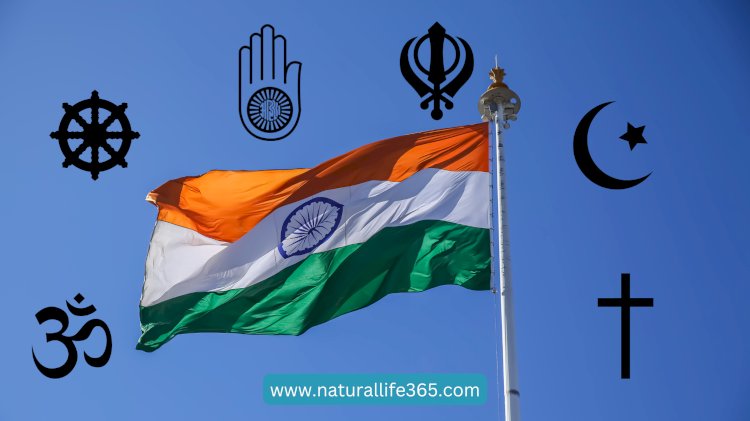Why India Embraces Secularism: A Deep Dive into Its Constitution and Culture
Dive deep into why India embraces secularism. Understand the constitutional and cultural foundations that support India's secular identity.

Secularism in India is not just a political ideology but a deeply embedded cultural value. The nation's commitment to secularism is both enshrined in its Constitution and reflected in its diverse society. However, like any principle in practice, India's secularism faces its share of challenges and criticisms. This blog will explore the historical roots of secularism in India, its constitutional basis, its manifestations in Indian culture, and the contradictions and criticisms that arise, especially concerning the perceived hypocrisy among secularists.
Introduction to Secularism in India
Definition of Secularism
Secularism, in its simplest form, is the principle of separating religion from the state. It advocates for a state that treats all its citizens equally, regardless of their religious beliefs and does not favor or promote any particular religion. This idea, while universal, manifests uniquely in different countries based on their historical, cultural, and social contexts.
The Unique Indian Context
India's secularism is distinctive. Unlike the Western concept of secularism, which often implies a strict separation between religion and state, Indian secularism allows for a more flexible relationship. The Indian state does not promote any one religion but actively engages with all religions to ensure peace and harmony. This approach stems from India's long history of religious diversity and coexistence.
Historical Roots of Secularism in India
Ancient Traditions of Religious Pluralism
India's history is replete with examples of religious tolerance and coexistence. Ancient India was home to diverse religious traditions, including Hinduism, Buddhism, Jainism, and later, Islam, Christianity, and Sikhism. The Mauryan Emperor Ashoka, for instance, is renowned for his policy of Dhamma, which promoted respect and tolerance for all religions.
The Bhakti and Sufi movements further exemplified India's inclusive approach to religion. These movements, which flourished during the medieval period, emphasized love, devotion, and equality, transcending rigid religious boundaries. They laid the groundwork for a culture where religious diversity was not just accepted but celebrated.
Influence of Colonial Rule
The British colonial period significantly influenced India's secularism. The British introduced a policy of divide and rule, exploiting religious differences for political gain. This period saw increased communal tensions, which culminated in the tragic partition of India in 1947. The horrors of partition underscored the need for a secular state that could transcend religious divisions and protect all citizens.
Indian leaders like Mahatma Gandhi and Jawaharlal Nehru were staunch advocates of secularism. Gandhi's vision of secularism was rooted in his belief in the equality of all religions, while Nehru saw secularism as essential for India's unity and progress. These leaders ensured that secularism became a cornerstone of the Indian Constitution.
The Constitutional Foundation of Indian Secularism
The Preamble: Secularism as a Core Value
The Indian Constitution, adopted in 1950, is the bedrock of the country's secularism. The Preamble to the Constitution declares India to be a "sovereign, socialist, secular, democratic republic." This declaration is not merely symbolic; it reflects the core values that guide the Indian state.
Fundamental Rights and Secular Provisions
The Constitution guarantees several fundamental rights that uphold the principle of secularism. Articles 25 to 28, in particular, protect the freedom of religion. Article 25 ensures that all individuals have the right to freely profess, practice, and propagate their religion. However, this right is subject to public order, morality, and health, ensuring that religious practices do not infringe on the rights of others.
Article 26 allows religious denominations to manage their affairs, while Article 27 prohibits the state from imposing taxes specifically to support any religion. Article 28 ensures that religious instruction is not provided in state-funded educational institutions. Together, these provisions create a framework where religion is respected, but not imposed by the state.
Judicial Interpretations and Key Cases
India's judiciary has played a crucial role in interpreting and upholding secularism. Landmark cases like the Shah Bano case and the Ayodhya dispute have tested the limits of secularism in India. In these cases, the courts have often had to balance religious freedoms with other constitutional rights, highlighting the complexities of practicing secularism in a diverse society.
In the Shah Bano case, the Supreme Court ruled in favor of a Muslim woman seeking alimony, a decision that was initially seen as a victory for secular principles but later led to political backlash and the passing of the Muslim Women (Protection of Rights on Divorce) Act, 1986. The Ayodhya case, involving the disputed site claimed by both Hindus and Muslims, was another significant test of India's secular credentials. The 2019 Supreme Court verdict, which awarded the land to Hindus while providing an alternate site for a mosque, reflected the delicate balancing act required in such cases.
Secularism in Indian Culture
India's cultural fabric is woven with threads of religious diversity. Festivals from different religions are celebrated with equal fervor across the country. Diwali, Eid, Christmas, and Guru Nanak Jayanti, among others, are not just religious observances but national celebrations. This cultural practice embodies the essence of Indian secularism, where different religions coexist and are honored together but in many cases, this is also a problem. Muslim families throw stones at Hindu processions or attack pilgrims creating a big chaos. Hindus and Buddhists don’t interfere with or damage Muslim ceremonies or celebrations. There are Muslim neighborhoods where you can’t celebrate Diwali because they destroy your lights, flowers, and rangolis decorations.
Interfaith marriages are another manifestation of India's secular culture. Bollywood, India's film industry, often portrays and celebrates such unions, reflecting the secular ethos although in real life, in the real India, this is a big problem, especially if one of the partners is Hindu. Muslim families don’t accept them and in 99% of the cases, this ends up in a tragedy. This is not seen among Hindu families, they are more open to receiving a Muslim or Christian into their families without the need to follow Hinduism.
You can also read Why is Bollywood Anti Hindu?
The Challenge of Hypocrisy in Indian Secularism
While Indian secularism is celebrated, it is not without its critics. One of the most significant criticisms is the perceived hypocrisy among those who claim to uphold secular values. This criticism is often directed at the selective outrage exhibited by some secularists.
For instance, when communal violence or discrimination against minorities occurs, there is a strong and vocal response from secular groups. This is undoubtedly important in upholding the principles of justice and equality. However, critics argue that the same groups are often silent or less vocal when Hindus are the victims of such violence, especially when perpetrated by minorities. This selective outrage raises questions about the consistency and sincerity of secularists in India.
Case Studies of Bias and Double Standards
Several incidents highlight this perceived hypocrisy. The 2002 Gujarat riots, where the majority of the victims were Muslims, garnered significant attention and condemnation from secular groups, as it should. However, the ethnic cleansing of Kashmiri Pandits in the late 1980s, which led to the mass exodus of Hindus from the Kashmir Valley, did not evoke a similar level of outrage from the same quarters. This disparity in response fuels the perception of bias.
Another example is the handling of religious conversions. Secularists often defend the right of individuals to convert to religions like Islam or Christianity but are critical of the "Ghar Wapsi" campaigns aimed at reconverting people to Hinduism. While forced conversions of any kind should be condemned, the selective criticism of such practices based on the religions involved again highlights a double standard.
The Role of Political Parties and Media
Secularism as a Political Tool
In India, secularism is not just a constitutional value but also a political tool. Political parties often use secularism to garner votes, particularly from religious minorities. This has led to accusations of "appeasement politics," where parties are perceived to favor certain religious communities to secure electoral support.
Media’s Role in Shaping Secular Narratives
The media plays a crucial role in shaping public perceptions of secularism in India. Through news reporting, opinion pieces, and even entertainment, the media has the power to influence how secularism is understood and practiced in society.
However, the media's role in this regard is double-edged. On one hand, it has been instrumental in bringing issues of religious intolerance and communal violence to the forefront, thus reinforcing the need for a secular state.
On the other hand, the media is often accused of bias and sensationalism, which can distort the secular narrative. The selective reporting of communal incidents, where certain narratives are amplified while others are downplayed or ignored, can deepen communal divides rather than bridge them. For instance, the extensive coverage of violence against religious minorities may be contrasted with relatively muted reporting on violence against Hindus, particularly when it is perpetrated by minority groups. This selective coverage can reinforce the perception of bias and hypocrisy in the secular discourse.
Moreover, the rise of digital and social media has added a new dimension to the discussion on secularism. While these platforms allow for diverse voices to be heard, they also enable the rapid spread of misinformation and communal propaganda. The echo chambers created by social media algorithms can exacerbate divisions, making it harder to have a balanced and nuanced discussion on secularism.
You can also read Understanding the Indian Caste System
The Future of Secularism in India
India's journey with secularism is ongoing, marked by both achievements and challenges. The country's commitment to secularism is enshrined in its Constitution and reflected in its vibrant, diverse culture. However, the practice of secularism in India is far from perfect. The selective outrage and perceived hypocrisy among some secularists, the role of political parties in manipulating secularism for electoral gains, and the media's sometimes biased portrayal of religious issues all pose significant challenges.
Despite these issues, secularism remains a vital part of India's national identity. The principle of treating all citizens equally, regardless of their religion, is crucial for maintaining the country's unity and integrity. However, for secularism to be truly effective, it must be practiced with consistency and sincerity. This means addressing injustices against all communities with equal fervor, resisting the politicization of religion, and fostering a media environment that is fair and balanced.
If you value these free online resources provided by Natural Life 365, please consider supporting my website by sharing the blogs ![]()









































